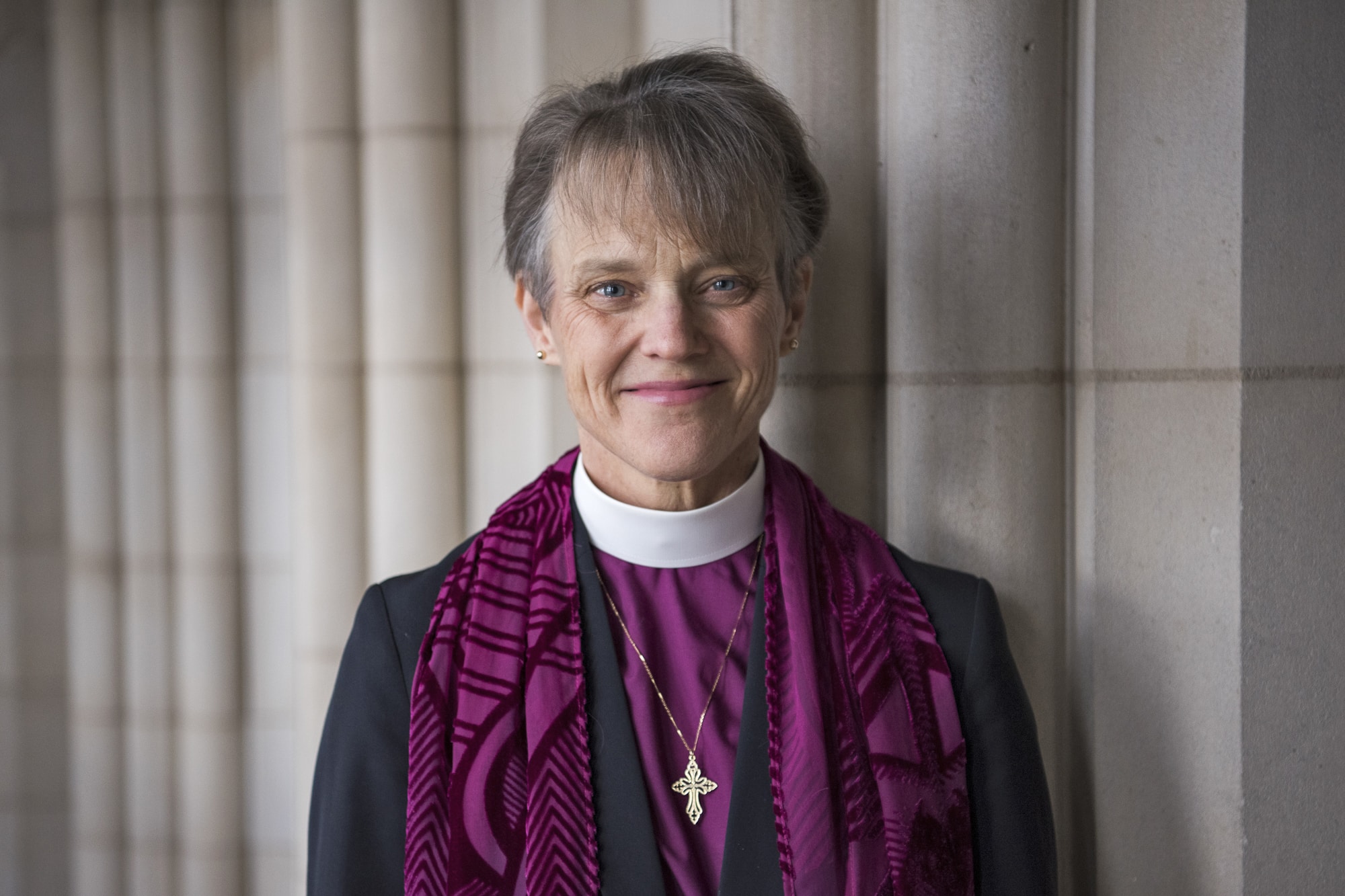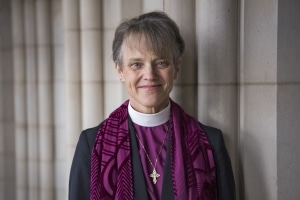Herod Goes to the National Cathedral and is Disappointed
It was amusing to me to hear Trump’s reaction to the service at the National Cathedral on January 21st. I’ve been a pastor for a long time, and heard many opinions offered about the quality (or lack thereof) of the services I’ve designed and led and the sermons I’ve given. To me, Trump’s reaction says a lot more about him than it does about Episcopal Bishop Mariann Edgar Budde.
To start things off, here’s the printed program [pdf] prepared for those who attended the service. (You can watch the video of the service on the Cathedral’s YouTube channel here.) Notice the title on the front cover: “A Service of Prayer for the Nation.” Notice what isn’t on the front cover? Two words: Donald Trump. The message is clear, right from the start – this isn’t a celebration of Trump, like the inaugural balls or the rally at the Capital One arena. This is a service for the nation.
Not for “the citizens of” the nation.
Not for “the taxpayers of” the nation.
Not for “the leaders of” the nation.
This was a service for the nation – the *whole* nation.
Trump can attend, but it’s not about him or for him. It’s a service for the nation.
It’s also a service of prayer, and as I browse through the program, I can’t help but see the *whole* nation raised up again and again and again.
The pre-service music is an eclectic mix. The carillon selections are largely American composers, pairing old composers with 20th and 21st century arrangers. Two of the compositions are by anonymous composers, whose names have been lost to history while their music has not. The four organ selections are by two Lutherans (Bach and Buxtehude) and two Jews (Fanny Mendelssohn and her younger brother Felix). Bach and the Mendelssohns were German, and Buxtehude’s roots are more complicated because of the changing borders of Denmark, Sweden, and northern Germany at the time he was born. The brass selections come from three great composers from three nations: John Rutter (England), Anton Dvorak (the Czech Republic), and Aaron Copland (one of the greatest American composers). The pre-service music concluded with five choral pieces, each of which has deep roots in American religious life. These selections set the tone: this is a service for all the nation, with a mix of instruments, a mix of composers, and music with a mix of ethnic and religious roots that befit the mixed and diverse roots of the nation.
The Entrance Rite began with words from Jesus in Mark 17: “My house shall be called a house of prayer for all people.” Note those last two words: all people. Not a few, not some, not many, but *all* people. After a blessing from the traditions of the First Americans, the indigenous people who were here long before the Mayflower and Jamestown; long before Cortez, Pizarro, Balboa, and Ponce de Leon; long before Columbus and long before the Norse; the opening hymn by Fred Kaan was sung by all who are present in this moment, beginning like this:
For the healing of the nations, God, we pray with one accord;
for a just and equal sharing of the things that earth affords;
to a life of love in action help us rise and pledge our word.
I can imagine that a beginning like this put Trump in a pickle. “It’s all woke crap” he must have been thinking. “When will we get to the acclamation of my win in the election? When will we get to their acknowledgment of my power, my success, my victory? When are we going to get to the praise of me?” Spoiler alert: Never, never, and never. Because this service was never going to be about Trump, and I’m sure that never even dawned on him as he arrived at the National Cathedral.
But back to the hymn.
Lead us forward into freedom; from despair your world release,
that, redeemed from war and hatred, all may come and go in peace.
Show us how through care and goodness fear will die and hope increase.
In the context of Trump’s campaign, and the even closer context of Trump’s post-election announcements of his plans for the first hours and days of his administration, these words are a respectful yet powerful rebuke. Kaan is quite clear: the vision of the God to whom this prayer is addressed is One who prizes justice, equality, love, freedom, peace, care of others, goodness, and finally hope. This God is likewise dedicated to the end of slavery, despair, war, hatred, and most of all, fear. That last list is Trump’s go-to list, and Kaan named and condemned it out loud, in no uncertain terms, in four part harmony.
But Kaan was not done.
All that kills abundant living, let it from the earth be banned;
pride of status, race, or schooling, dogmas that obscure your plan.
In our common quest for justice may we hallow life’s brief span.
I knew Fred Kaan, whose early life was shaped by his family’s work in the Dutch resistance to the Nazis during World War II. He knew, firsthand, the ugliness of life under leaders who prize race and status, who punish and kill those who are Not Like Us. That first word – All! – leaps out with power, this time aimed at each and every power that divides, diminishes, and kills the abundant life God intends for all people. These are words of resistance, written by one who (along with his family) lived a life of resistance during WWII. These are words offering hope to those unwilling to sell their souls to MAGA and Trump, and sending a shiver through Trump and JD Vance if they were paying attention.
And Kaan is still not done, as he ties up this hymn with one last broadside against the MAGA Un-Gospel:
You, Creator God, have written your great name on humankind;
for our growing in your likeness bring the life of Christ to mind
that by our response and service earth its destiny may find.
Those who pray this prayer — who sing this song — are not praying to shut refugees seeking safety out of the country. They are not praying to round up those who lack the right paperwork to live here, put them in detention camps, and shove them elsewhere. They are not praying to celebrate the exceptionalness of one race or nation or person above the rest of humanity. They are not praying to sit back in comfortable wealth and luxury, leaving it to the poor and needy to pull themselves up by their own bootstraps.
In one short hymn, the entire inaugural address that Trump gave the day before was ripped apart, using the voices that come from the throats of everyone sitting around him. His entire campaign message was challenged and opposed, by every voice that rang to the vaulted ceiling and was broadcast out to the world. Kaan died in 2009, but this hymn sounds as if it could have been written last week. And Trump had to sit there and take it, with all the cameras rolling.
Worst of all for Trump, this was but the beginning of the service.
I’m not going to go through the rest of the service in this kind of detail – you can do that for yourself. There were prayers offered by folks from all kinds of religious traditions – Christians of various denominations, as well as Jewish, Muslim, Hindu, Buddhist, and Sikh leaders. These prayers were filled with words like “all” and “every” to paint a picture of our common life together. In the “prayers for all who govern,” the first petition was not for President Trump, but for “all the peoples of the earth,” and moved more narrowly to “the people of our nation” meaning all the people. In the “prayers for those who serve,” the petitions were offered for those in the armed forces and the diplomatic corps, for all civil servants that “they serve with integrity and compassion, without prejudice or partiality to better their communities and the nation,” for all teachers and educators, for all first responders, and critically at the end, “all the people of our land.” In the “prayers for the peoples of this nation,” Methodist Bishop LaTrelle Easterling opened them like this: “O God, whom we cannot love unless we love our neighbor, let us pray for the most vulnerable in our community and lead us to be present with them in their suffering.” This was followed by petitions of specific and vivid mention of those who are most vulnerable.
All this is what led up to the sermon by the Right Reverend Mariann Edgar Budde that garnered such attention in the media and such opprobrium from Trump. He tried to personalize it, demanding an apology from her, but far from her being some isolated voice standing up to him, or some he said/she said debate, Budde was speaking out of the deep religious traditions of a very diverse nation:
In the name of our God, I ask you to have mercy upon the people in our country.
We’re scared now. The people who pick our crops and clean our office buildings, who labor in poultry farms and meatpacking plants, who wash the dishes after we eat in restaurants and work the night shifts in hospitals.
They may not be citizens or have the proper documentation, but the vast majority of immigrants are not criminals. They pay taxes, and are good neighbors. They are faithful members of our churches and mosques, synagogues, gurdwara, and temples.
I ask you to have mercy, Mr. President, on those in our communities whose children fear that their parents will be taken away, and that you help those who are fleeing war zones and persecution in their own lands to find compassion and welcome here.
This now-famous plea directed specifically to President Trump, offered in a quiet and measured words, was not a one-off. In that plea, she summed up and made plain the implications of Kaan’s opening hymn, the words of the prayers offered throughout the whole service, and everything that took place in the 90 minutes before she took her place in the pulpit and began to speak. If Trump was waiting for the service to finally turn to him, this plea is when it happened — and it pissed him off.
What Budde did, in all humility and in all power, was to name Trump for what he is: one of us, with specific powers and abilities to directly shape life for all the people of the country, and indirectly for the world. Note, though, that what she pleaded for from Trump was of a piece with all the music and prayers, calling on every one of us to use our own far smaller powers and abilities to shape life for all the people in our orbit for the better, as small as our powers may be compared with the powers wielded by Trump.
That, perhaps, is what most put Trump out of joint. She was saying to him “Your title may be fancier, your staff may be grander, cameras may follow your every movement, and microphones strain to catch your every word, but in the end, you share the same task as the lowliest person who cleans hotel rooms, who labors to pick crops and build homes and process poultry while undocumented. You are One of Us, no more special and no less special, no matter how much you long for it to be otherwise.”
I’ve preached to congregations that have included mayors and city officials. I’ve preached to state legislators, state executive branch officials, and state supreme court justices. I’ve preached in services attended by a presidential candidate (Illinois Senator Paul Simon). One thing that has sustained me in those settings, and given me the strength to say what needs to be said, is the strong sense of being surrounded by the voices of the ancestors, preaching this same good news to them that I preach to the lowliest and most marginalized- that all that God has made is good, and all deserve support and care and love from each other.
Several years ago, on the eve of the first anniversary of January 6th, I compared Trump with King Herod who tried to use the wise men so he could kill the infant born to be the Messiah, and I used not simply the account from the Gospel of Matthew but also the retelling of the story by James Taylor in his song “Home By Another Way. Here, in part, is what I wrote that day:
But Taylor isn’t singing just to retell the story of what happened back then. He’s preaching, in his own way, drawing his listeners into the song and changing us here today:
Well it pleasures me to be here
And to sing this song tonight
They tell me that life is a miracle
And I figure that they’re right
But Herod’s always out there
He’s got our cards on file
It’s a lead pipe cinch
If we give an inch
That Herod likes to take a mileIt’s best to go home by another way
Home by another way
We got this far to a lucky star
But tomorrow is another day
We can make it another way
“Safe home!” as they used to say
Keep a weather eye to the chart up high
And go home another wayYes, Herod *is* always out there, looking to game the system and rape the system and break the system if that’s what it takes to keep himself in power.
But there is also always another way, a way that leaves Herod and his successors powerless and impotent.
My description of Herod’s/Trump’s way came back to mind with a crash on the 20th, as word of all those initial executive orders came tumbling out. Saying Trump is “looking to game the system and rape the system and break the system if that’s what it takes” back then seems frighteningly prescient today.
But like the wise men of old, Bishop Budde knows another way, as do all those who planned this most powerful service, and as did Fred Kaan. In JT’s words, in the face of Trump’s blizzard of executive orders which are designed to take and take and take some more from the most vulnerable among us, Budde didn’t give an inch. Instead, she stood in the path of our American Herod along with a host of others, naming that other way home.
And here’s the really really good news, that would scare Trump even more if he were to think about it: you don’t have to be a bishop to name Herod for who he is, to call out his ways of fear and death, and to lift up our neighbors. That’s what the wise men did, in going home by another way. They protected a poor, vulnerable refugee-to-be from a vengeful tyrant who feared for his own power. And that’s what each of us can do, wherever we are: name Trump’s way as the path of division, destruction, and death, and point to another way.
Because JT was right: it’s best to go home by another way.



 CC BY 2.0
CC BY 2.0